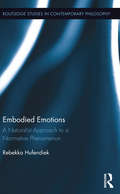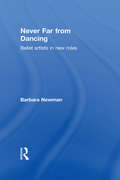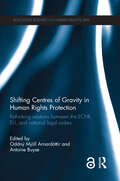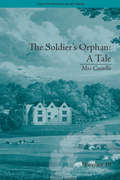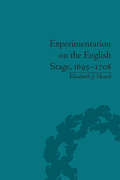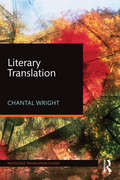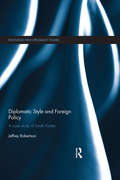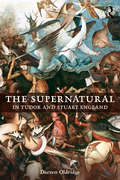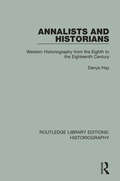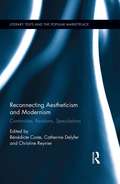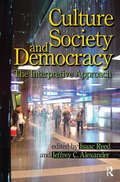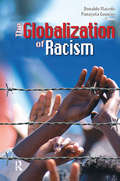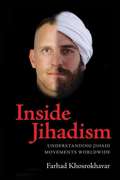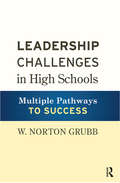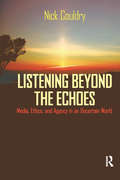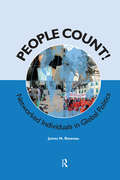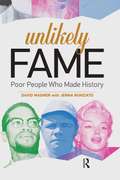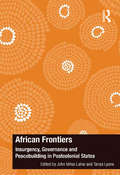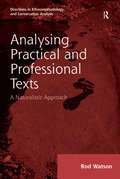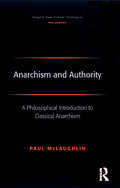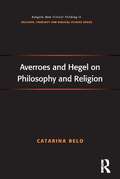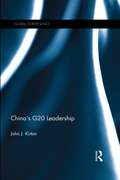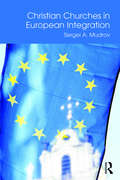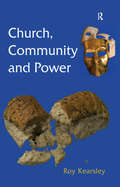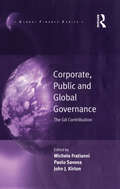Special Collections
Benetech’s Global Certified Accessible Titles
Description: Benetech’s GCA program is the first independent third-party EPUB certification to verify ebook accessibility. By creating content that is born accessible, publishers can meet the needs of all readers. Learn more: https://bornaccessible.benetech.org/
- Table View
- List View
Embodied Emotions
by Rebekka HufendiekIn this book, Rebekka Hufendiek explores emotions as embodied, action-oriented representations, providing a non-cognitivist theory of emotions that accounts for their normative dimensions. Embodied Emotions focuses not only on the bodily reactions involved in emotions, but also on the environment within which emotions are embedded and on the social character of this environment, its ontological constitution, and the way it scaffolds both the development of particular emotion types and the unfolding of individual emotional episodes. In addition, it provides a critical review and appraisal of current empirical studies, mainly in psychophysiology and developmental psychology, which are relevant to discussions about whether emotions are embodied as well as socially embedded. The theory that Hufendiek puts forward denies the distinction between basic and higher cognitive emotions: all emotions are embodied, action-oriented representations. This approach can account for the complex normative structure of emotions, and shares the advantages of cognitivist accounts of emotions without sharing their problems. Embodied Emotions makes an original contribution to ongoing debates on the normative aspects of emotions and will be of interest to philosophers working on emotions, embodied cognition and situated cognition, as well as neuroscientists or psychologists who study emotions and are interested in placing their own work within a broader theoretical framework.
Never Far from Dancing
by Barbara NewmanA series of interviews with some of the foremost dancers in twentieth-century ballet, Never Far from Dancing reflects on the paths that their careers have taken since they retired from the stage. Barbara Newman has expertly edited each of her interviews to read as a monologue, addressing every aspect of ballet, from its styles and technical demands to its personalities, its celebrated roles and, most of all, to what happens when the dancing stops. While ballet invites all manner of writing from critics, admirers and academics, the thoughts and experiences of the dancers themselves are seldom recorded. Here, those who scaled the heights of their art hand down their wisdom and recount lives spent in this most enduring of art forms.
Shifting Centres of Gravity in Human Rights Protection
by Antoine Buyse and Oddný Mjöll ArnardóttirThe protection of human rights in Europe is currently at a crossroads. There are competing processes which push and pull the centre of gravity of this protection between the ECHR system in Strasbourg, the EU system in Luxemburg and Brussels, and the national protection of human rights. This book brings together researchers from the fields of international human rights law, EU law and constitutional law to reflect on the tug-of-war over the positioning of the centre of gravity of human rights protection in Europe. It addresses both the position of the Convention system vis-à-vis the Contracting States, and its positioning with respect to fundamental rights protection in the European Union. The first part of the book focuses on interactions in this triangle from an institutional and constitutional point of view and reflects on how the key actors are trying to define their relationship with one another in a never-ending process. Having thus set the scene, the second part takes a critical look at the tools that have been developed at European level for navigating these complex relationships, in order to identify whether they are capable of responding effectively to the complexities of emerging realities in the triangular relationship between the EHCR, EU law and national law.
The Soldier's Orphan
by Clare Broome SaundersThis is a novel virtually forgotten by modern readers, but one that deserves reassessment with this critical edition. Raised by guardians, Louisa’s fate is intertwined with the neighbouring Stanley family, including the jealous younger daughter, Armida – whose husband Lord Belmour openly admires Louisa and which propels the plot forward.
Experimentation on the English Stage, 1695-1708
by Elisabeth J HeardAt the beginning of the eighteenth century, British theatre saw a shift from what critics call 'Restoration' to 'sentimental' comedy. Focusing on the career of the Irish dramatist George Farquhar (1678-1707), this book argues that experimentation was the basis for this change.
Literary Translation
by Chantal WrightRoutledge Translation Guides cover the key translation text types and genres and equip translators and students of translation with the skills needed to translate them. Concise, accessible and written by leading authorities, they include examples from existing translations, activities, further reading suggestions and a glossary of key terms. Literary Translation introduces students to the components of the discipline and models the practice. Three concise chapters help to familiarize students with: what motivates the act of translation how to read and critique literary translations how to read for translation. A range of sustained case studies, both from existing sources and the author’s own research, are provided along with a selection of relevant tasks and activities and a detailed glossary. The book is also complemented by a feature entitled ‘How to get started in literary translation’ on the Routledge Translation Studies Portal (http://cw.routledge.com/textbooks/translationstudies/). Literary Translation is an essential guidebook for all students of literary translation within advanced undergraduate and postgraduate/graduate programmes in translation studies, comparative literature and modern languages.
Diplomatic Style and Foreign Policy
by Jeffrey RobertsonThe book explores diplomatic style and its use as a means to provide analytical insight into a state’s foreign policy, with a specific focus on South Korea. Diplomatic style attracts scant attention from scholars. It is dismissed as irrelevant in the context of diplomacy’s universalism; misconstrued as a component of foreign policy; alluded to perfunctorily amidst broader considerations of foreign policy; or wholly absented from discussions in which it should comprise an important component. In contrast to these views, practitioners maintain a faith-like confidence in diplomatic style. They assume it plays an important role in providing analytical insight, giving them advantage over scholars in the analysis of foreign policy. This book explores diplomatic style and its use as a means to provide analytical insight into foreign policy, using South Korea as a case study. It determines that style remains important to diplomatic practitioners, and provides analytical insight into a state’s foreign policy by highlighting phenomena of policy relevance, which narrows the range of information an analyst must cover. The book demonstrates how South Korea’s diplomatic style – which has a tendency towards emotionalism, and is affected by status, generational change, cosmopolitanism, and estrangement from international society – can be a guide to understanding South Korea’s contemporary foreign policy. This book will be of much interest to students of diplomacy studies, foreign policy, Asian politics, and International Relations in general.
The Supernatural in Tudor and Stuart England
by Darren OldridgeThe Supernatural in Tudor and Stuart England reflects upon the boundaries between the natural and the otherworldly in early modern England as they were understood by the people of the time. The book places supernatural beliefs and events in the context of the English Reformation to show how early modern people reacted to the world of unseen spirits and magical influences. It sets out the conceptual foundations of early modern encounters with the supernatural, and shows how occult beliefs penetrated almost every aspect of life. Darren Oldridge considers many of the spiritual forces that pervaded early modern England: an immanent God who sometimes expressed Himself through ‘signs and wonders’ and the various lesser inhabitants of the world of spirits including ghosts, goblins, demons and angels. He explores human attempts to comprehend, harness or accommodate these powers through magic and witchcraft, and the role of the supernatural in early modern science. This book presents a concise and accessible up-to-date synthesis of the scholarship of the supernatural in Tudor and Stuart England. It will be essential reading for students of early modern England, religion, witchcraft and the supernatural.
Annalists and Historians
by Denys HayThis book, originally published in 1977, is a survey of European historiography from its origins in the historians of Greece and Rome, through the annalists and chroniclers of the middle ages, to the historians of the late eighteenth century. The author concentrates on those writers whose works fit into a specific category of writing, or who have inlfuence the course of later historical writing, though he does deal with some of the more specialist forms of medieval historiography such as the crusading writers, and chivalrous historians like Froissart. He maintains that ‘modern’ history did not develop until the 18th Century.
Reconnecting Aestheticism and Modernism
by Christine Reynier and Bénédicte Coste and Catherine DelyferCharting the period that extends from the 1860s to the 1940s, this volume offers fresh perspectives on Aestheticism and Modernism. By acknowledging that both movements had a passion for the ‘new’, it goes beyond the alleged divide between Modernism and its predecessors. Rather than reading the modernist credo, ‘Make it New!’, as a desire to break away from the past, the authors of this book suggest reading it as a continuation and a reappropriation of the spirit of the ‘New’ that characterizes Aestheticism. Basing their arguments on recent reassessments of Aestheticism and Modernism and their articulation, contributors take up the challenge of interrogating the connections, continuities, and intersections between the two movements, thus revealing the working processes of cultural and aesthetic change so as to reassess the value of the new for each. Attending to well-known writers such as Waugh, Woolf, Richardson, Eliot, Pound, Ford, Symons, Wilde, and Hopkins, as well as to hitherto neglected figures such as Lucas Malet, L.S. Gibbon, Leonard Woolf, or George Egerton, they revise assumptions about Aestheticism and Modernism and their very definitions. This collection brings together international scholars specializing in Aestheticism or Modernism who push their analyses beyond their strict period of expertise and take both movements into account through exciting approaches that borrow from aesthetics, philosophy, or economics. The volume proposes a corrective to the traditional narratives of the history of Aestheticism and Modernism, revitalizing definitions of these movements and revealing new directions in aestheticist and modernist studies.
Culture, Society, and Democracy
by Jeffrey C. Alexander and Isaac ReedThis volume addresses the key question of the intersection of sociology and politics, and asks what a non-Marxist cultural perspective can offer the Left. Written by leading scholars, it develops new conceptions of social critique, new techniques of interpretive analysis, and new concepts for the sociology of democratic practice. It is a volume for the twenty-first-century, where global and local meet, when critical theory must examine its most fundamental presuppositions.
Globalization of Racism
by Donaldo Macedo and Panayota GounariAddressing ethnic cleansing, culture wars, human sufferings, terrorism, immigration, and intensified xenophobia, "The Globalization of Racism" explains why it is vital that we gain a nuanced understanding of how ideology underlies all social, cultural, and political discourse and racist actions. The book looks at recent developments in France, Germany, Greece, Ireland, Israel, Italy, Portugal, Spain and the United States and uses examples from the mass media, popular culture, and politics to address the challenges these and other countries face in their democratic institutions. The eminent authors of this important book show how we can educate for critical citizenry in the ever-increasing multicultural and multiracial world of the twenty-first century. Contributors are: David Theo Goldberg, Loic Wacquant, Edward W. Said, Zygmunt Bauman, Peter Mayo and Carmel Borg, Anna Aluffi Pentini and Walter Lorenz, Peter Gstettner, Georgios Tsiakalos, Franz Hamburger, Julio Vargas, Lena de Botton and Ramon Flecha, Concetta Sirna, Jan Fiola, Joao Paraskeva, Henry A. Giroux. It explores new forms of racism in the era of globalization.
Inside Jihadism
by Farhad KhosrokhavarJihad is the most organized force against Western capitalism since the Soviet era. Yet jihadism is multifaceted and complex, much broader than Al Qaeda alone. In the first wide-ranging introduction to today's rapidly growing jihadism, Khosrokhavar explains how two key movements variously influence jihadi activists. One, based in the Middle East, is more heavily influenced by Islamic religion and political thought. The other, composed of individuals growing up or living mostly in Europe and Western democracies including the United States, is motivated by secular as well as religious influences. Khosrokhavar interprets religious and lesser-known Arabic texts and the real-world economic and political dynamics that make jihadism a growing threat to Western democracies. Interviews with imprisoned jihadists on what motivated their plots and actions help the readers understand reality as seen by jihadists. The author concludes with recommendations to safeguard democracies from future jihadism.
Leadership Challenges in High Schools
by W. Norton GrubbPrincipals are responsible for an increasing range of duties in an era of school reform, standardized testing, and more. These responsibilities are even greater in high schools, which are many times larger and more complex than elementary and middle schools. Yet little has been written on the special challenges of high schools and their leadership. This book fills the gap by exploring the challenges specific to high schools, including their size and complexity, the special difficulties in improving instruction, the crucial role of high schools for students' futures, adolescent behavioral issues, and many more. Grubb shows how principals and other leaders can address the complexities of multiple pathways, or efforts to create theme-based trajectories through high school - one of the most promising high school reforms. Looking to the future, he offers alternative ways of preparing professionals for high schools, and the responsibilities of districts for improving high schools and their leadership.
Listening Beyond the Echoes
by Nick CouldryIn this book Nick Couldry, media and cultural theorist from the London School of Economics, asks what are the priorities for media and cultural research today - at a time of the intensified mediation of all fields of social life, threats to democratic legitimacy, and serious instability on the global political stage. The book calls for a "decentered" media research that rejects easy assumptions about media's role in holding societies together and instead looks more critically at the difference media make on the ground to the material conditions of our lives. In what detailed ways do media transform knowledge and agency in daily life? How do media contribute to the culture of democratic politics? And, most difficult of all, how can we live, ethically, with and through media? Couldry's previous work is well known for its breadth, ranging across media sociology, media theory and cultural theory. Here he draws also on political theory and ethics to develop a tightly-argued account of how media and cultural research must now reorient itself if it is to remain relevant and critical. Nick Couldry is Reader in Media, Communications and Culture at the London School of Economics and Political Science. He is the author or editor of five books including Media Rituals: A Critical Approach (Routledge 2003), The Place of Media Power (Routledge 2000) and (coedited with James Curran) Contesting Media Power (Rowman and Littlefield 2003).
People Count!
by James N. RosenauPeople Count! rests on a single but important premise: As the world shrinks and becomes ever more complex, so have people-as "networked individuals"-become ever more central to the course of events. This book seeks to depict a new era by analyzing the basic roles people occupy in their family, community, and society, including the wider world.
Unlikely Fame
by David WagnerThis unique book depicts the stories of Americans born in poverty, who achieved national or international fame. Accessible to students and lay readers, this scholarly study describes poverty as a disability that typically stunts important areas of growth in childhood. Wagner shows how poverty hampers individuals and groups for their entire lives, even many of those who emerge from poverty. Examples of individuals with difficult childhoods who faced residual lifelong challenges are presented in the stories of 27 Americans, including athlete Babe Ruth, birth control advocate Margaret Sanger, singer Billie Holliday, author Jack London, actress Marilyn Monroe, black leader Malcolm X, singer Johnny Cash, comedian Richard Pryor, author Stephen King, and entertainer Oprah Winfrey. In over 200 engaging and accessible pages, Unlikely Fame yields insight into successful individuals and how they coped, adapted and ultimately achieved success.
African Frontiers
by John Idriss Lahai and Tanya LyonsThrough a multidisciplinary approach, African Frontiers counters the superficial, Eurocentric and gender insensitive dominant discursive representation of Africa within the discourse of war and conflict management, and security and peace/nation-building. The chapters historicize and theorize the realities in postcolonial African states, and the ramifications on the continents future. Situating the study within the context of the prevailing cultural and geo-political realities in the postcolonial African states, the chapters illustrate the complex ways in which events and processes are experienced at the local level, and how these local realities in turn impact and shape the patterns of political and military engagement in Africa and beyond. Organized along three major themes: Insurgency, governance and peacebuilding, expert researchers from around the world contribute chapters on: Rebel and insurgent formations such as the RUF, the LRA, and Boko Haram; state governance and corruption; terrorism and counter terrorism; security and peacebuilding; focussing on the tensions and challenges facing post-conflict societies such as Sierra Leone, Rwanda, and the newest nation-state on the continent, South Sudan. This highly significant and topical study problematizes the impact of wars on African nations, as well as the epistemological framing of the local realities and fallouts of armed conflict on post-colonial states.
Analysing Practical and Professional Texts
by Rod WatsonAnalysing Practical and Professional Texts focuses on texts as constituents of human usage, showing how written documents and other 'texts' are integral to social organization. It reveals social organization itself to be not only textually-mediated in nature, but also textually-constituted, showing how texts - professional, technical or otherwise - as well as various social-scientific methodologies employ the resources of ordinary language. Theoretically sophisticated and illustrated with empirical examples, this book will be of interest not only to those with interests in ethnomethodology and conversation analysis, but also to social scientists and anthropologists concerned with text analysis, textual sense and the 'linguistic turn' in the methods of their own disciplines.
Anarchism and Authority
by Paul McLaughlinExamining the political theory of anarchism from a philosophical and historical perspective, Paul McLaughlin relates anarchism to the fundamental ethical and political problem of authority. The book pays particular attention to the authority of the state and the anarchist rejection of all traditional claims made for the legitimacy of state authority, the author both explaining and defending the central tenets of the anarchist critique of the state. The founding works of anarchist thought, by Godwin, Proudhon and Stirner, are explored and anarchism is examined in its historical context, including the influence of such events as the Enlightenment and the French Revolution on anarchist thought. Finally, the major theoretical developments of anarchism from the late-nineteenth century to the present are summarized and evaluated. This book is both a highly readable account of the development of anarchist thinking and a lucid and well-reasoned defence of the anarchist philosophy.
Averroes and Hegel on Philosophy and Religion
by Catarina BeloComparing Averroes’ and Hegel’s positions on the relation between philosophy and religion, this book explores the theme of the authorities of faith and reason, and the origin of truth, in a medieval Islamic and a modern Christian context respectively. Through an in-depth analysis of Averroes’ and Hegel’s parallel views on the nature of philosophical and religious discourse, Belo presents new insights into their perspectives on the relation between philosophical knowledge and religious knowledge, and the differences between philosophy and religion. In addition, Belo explores particular works which have not yet been studied by modern scholarship.
China’s G20 Leadership
by John J. KirtonKirton offers a comprehensive, systematic examination of China’s G20 approach, diplomacy and influence since the G20’s start as a forum for finance ministers and central bankers in 1999. This comprehensive reference tool works its way through China’s elevation to the leaders’ level with summits from 2008-2014, to the prospects for its Antalya Summit in November 2014 and above all China’s first summit as host in Hangzhou in the autumn of 2016. This book contains a full treatment of China’s role in the summits from 2011 to 2014, and China’s plans, role and prospects for the summits in 2015 and 2016. Analytically, it develops and tests at the level of a single member country the systemic hub model of G20 governance that was developed for and guided in Kirton’s 2013 book, G20 Governance for a Globalized World.
Christian Churches in European Integration
by Sergei A. MudrovAll too often religion is largely ignored as a driver of identity formation in the European context, whereas in reality Christian Churches are central players in European identity formation at the national and continental level. Christian Churches in European Integration challenges this tendency, highlighting the position of churches as important identity formers and actors in civil society. Analysing the role of Churches in engaging with two specific EU issues – that of EU treaty reform and ongoing debates about immigration and asylum policy – the author argues that Churches are unique participants in European integration. Establishing a comprehensive view of Christian Churches as having a vital role to play in European integration, this book offers a substantial and provocative contribution both to our understanding of the European Union and the broader question of how religious and state institutions interact with one another.
Church, Community and Power
by Roy KearsleyIn the era of 'post-Christendom', how can church as a sociological reality be switched on to the destructive dangers, yet constructive possibilities, of 'power' flowing in and around its community? Attuned to the current distrust of church power, this book creatively works out responses that could turn painful censure into a re-visioning of church power relations, helped by neglected critical studies. The approach exposes a complexity to power, and filters that insight into a theology of church. The book shows how lessons are available for a religious community from post-modern philosopher Michel Foucault and from recent feminism. The topic of power has universal importance in the study of religion, though the response to analysis and critique in this book is drawn specifically from Christian sources. Kearsley concludes with an exploration for a future renovated, self-critical, authentic and growing community, sensitive to power while remaining in line with classic Christianity.
Corporate, Public and Global Governance
by Michele Fratianni and Paolo SavonaThe intensifying pace of globalization has led to a questioning of the traditional approaches to governance at the corporate, national and international levels. The crash of the dot-com bubble and the outbreak of corporate accounting scandals in the United States, along with the debt burden of financial institutions in Japan and Europe, have led to demands for major reforms. Consequently, national governments are confronting stronger demands for new ways to regulate corporations to fulfil their social responsibilities and generate growth in a competitive world. This volume explores three central questions: what forms of corporate governance are most desirable for the globalizing world of the twenty-first century? What forms of public governance are most appropriate in this new age? And how well are the world's leading national governments pioneering the needed policies and practices? The book offers an analysis of the G8's role in assisting governments and corporations to work together to design and deliver a superior approach.
